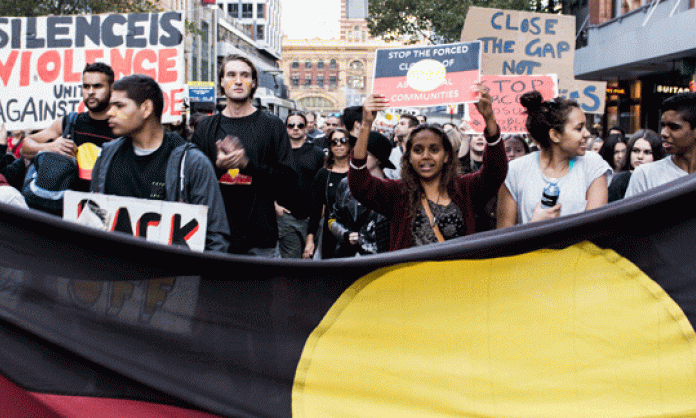In Victoria, New South Wales and Western Australia, the construction division of the CFMEU has backed the campaign against the closure of remote Aboriginal communities in WA.
At the union’s March branch meeting, Victorian construction workers voted unanimously for a motion expressing solidarity with the communities under attack and pledging that no union member would participate in the demolition of the towns being threatened. A similar motion was also passed in the WA branch. In NSW, CFMEU members have participated in a social media campaign to highlight union support for Aboriginal rights.
The cause has also enjoyed broader union support. On 21 April, the Australian Council of Trades Unions passed a motion condemning the closures. The peak union body called on “the Abbott Government to restore funding for Aboriginal communities and the Barnett Government to end the political funding games”.
The WA branch of the Maritime Union of Australia has also condemned the proposed closures, voting unanimously for a resolution moved by one of its Aboriginal members. The MUA has had a presence at rallies around the country. In Victoria, where protests have been the biggest, a number of unions have attended, including the Australian Services Union and the Health and Community Services Union.
The union movement has a long history of standing in solidarity with Aboriginal struggle. During the longest strike in Australian history – which started in 1946 with a walk-off of Aboriginal pastoral workers in the Pilbara – unions and trades and labour councils across the country sent money to support the strikers. In 1949, it was the action of the WA branch of the Seamen’s Union of Australia that helped force the dispute to a head when the union banned the transportation of scab wool from the Pilbara.
In 1980, during the fight to stop mining exploration on Aboriginal Land at Nookanbah Station in WA, unionised truckies refused to transport drilling rigs to the site. More recently, in 2012, members of the Queensland branch of the Electrical Trades Union linked arms in front of police to prevent the removal of the Aboriginal Tent Embassy in Brisbane’s Musgrave Park.
Solidarity is a basic tenet of unionism. The same governments attacking Aboriginal rights have unions in their sights. We are stronger if we stand together.
Tony Abbott’s royal commission into “trade union corruption” is one example. It hasn’t produced a scrap of evidence of union misconduct, but the truth was never within its terms of reference. Similarly, the Northern Territory intervention had nothing to do with Aboriginal welfare or child protection, and everything to do with undermining land rights.
Both are free kicks to the bosses, as are the latest attacks on Aboriginal communities. The effect will be to push Aboriginal people off their land so Gina Rinehart and her ilk can make mega-profits digging up the earth, while smashing the working conditions of those who build and operate the mines.
The solidarity shown by unions so far is a good start. But more can and should be done. Pledges and motions must be coupled with a willingness to take action.
A victory for our side would put the Liberal government and the bosses on the back foot. We should all encourage our workmates to come along to the rallies and our unions to throw their whole weight behind this campaign. An injury to one is an injury to all.










